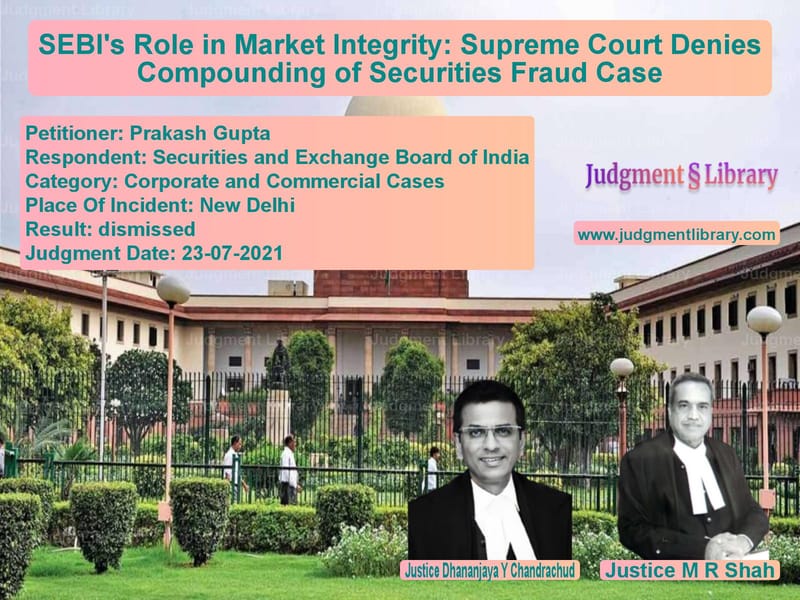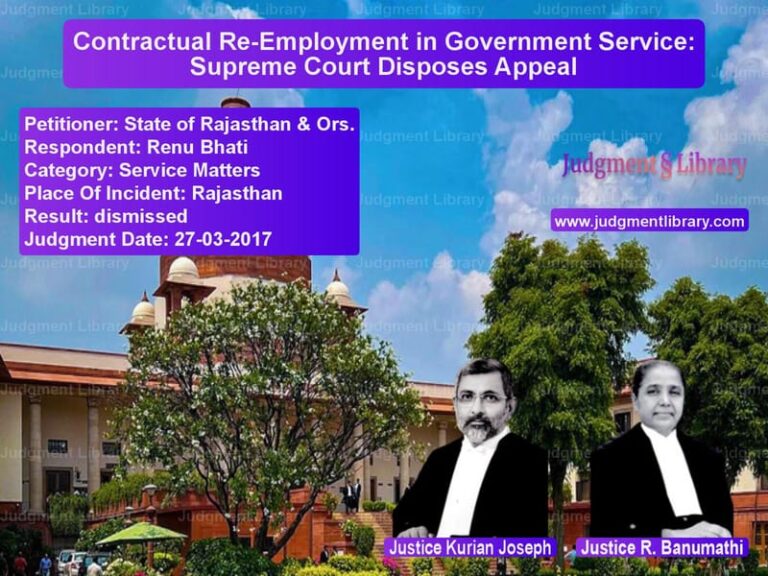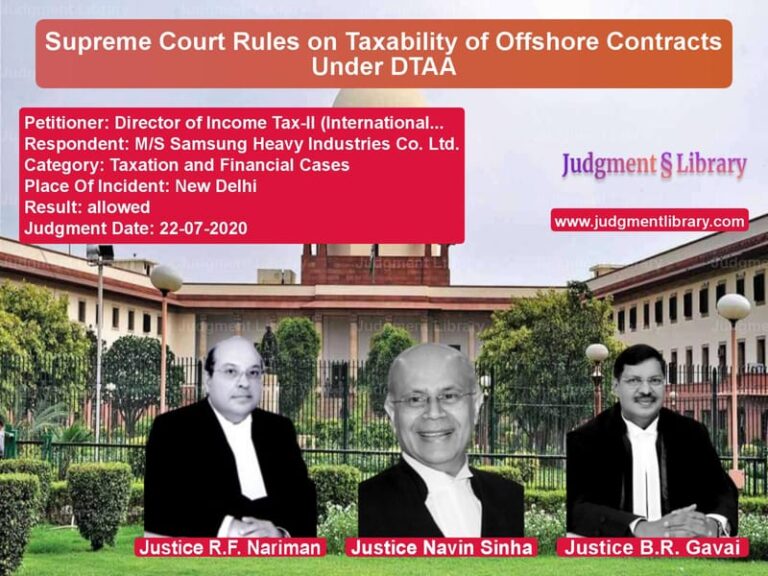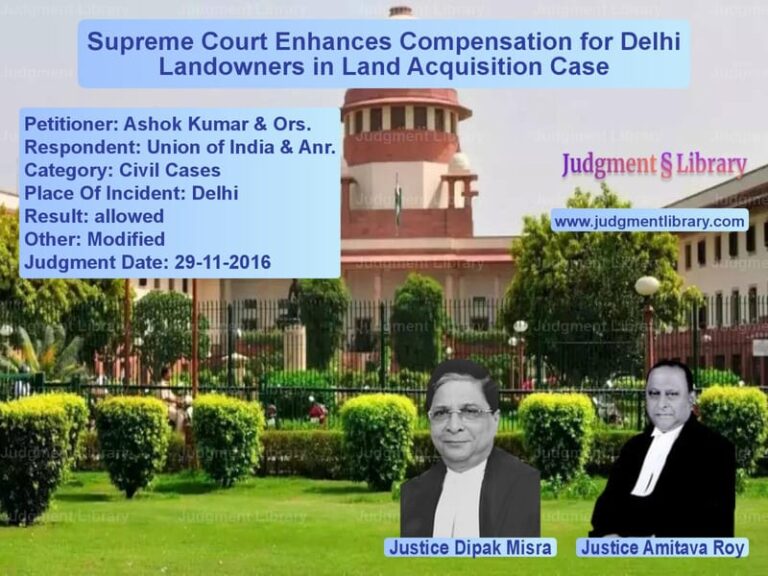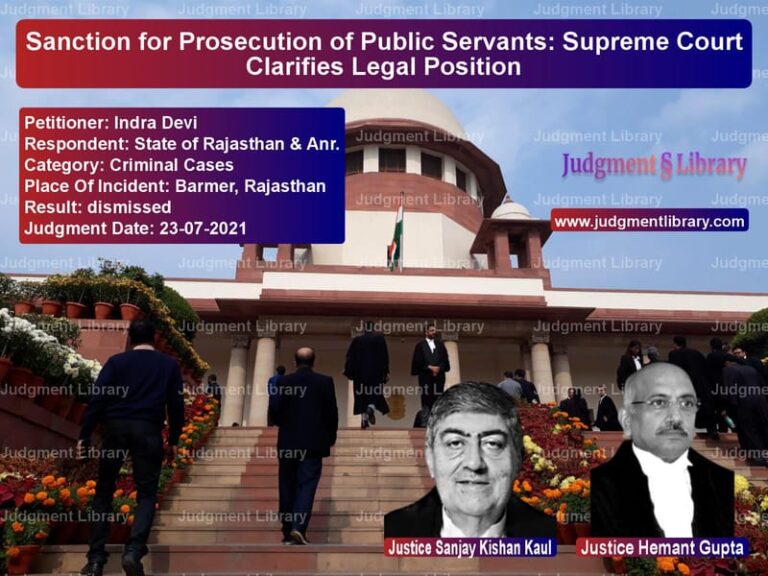SEBI’s Role in Market Integrity: Supreme Court Denies Compounding of Securities Fraud Case
The case of Prakash Gupta v. Securities and Exchange Board of India (SEBI) is a landmark judgment concerning the power to compound offences under the SEBI Act, 1992. The Supreme Court of India ruled against the compounding of securities fraud offences, emphasizing the significance of market integrity and investor protection. The judgment clarifies the role of SEBI in ensuring that securities law violations are not diluted through compounding, thereby strengthening regulatory enforcement mechanisms.
Background of the Case
The appellant, Prakash Gupta, was accused of securities market manipulation under Section 24(1) of the SEBI Act, 1992. He sought compounding of the offence under Section 24A, which allows for settlement of offences without criminal conviction. However, the trial court denied his request, and the Delhi High Court upheld the decision, stating that compounding in securities fraud cases required a thorough assessment of public interest.
Read also: https://judgmentlibrary.com/agr-dues-dispute-supreme-court-rejects-modification-plea/
Compounding of offences refers to a legal mechanism where an accused can settle charges by paying a penalty instead of undergoing prosecution. This provision is meant to expedite justice and reduce litigation in minor cases. However, in financial fraud cases, the issue of compounding raises concerns about regulatory enforcement and the need to maintain market stability.
Key Legal Issues in the Case
- Whether SEBI’s consent is mandatory for compounding offences under Section 24A of the SEBI Act.
- Whether courts and the Securities Appellate Tribunal (SAT) have independent powers to compound offences.
- Whether compounding should be allowed at any stage of the trial.
- The balance between regulatory enforcement and judicial discretion in compounding financial offences.
Arguments by the Petitioner (Prakash Gupta)
The petitioner, Prakash Gupta, argued:
- The alleged offence was technical in nature and did not result in direct financial loss to investors.
- SEBI had previously accepted a settlement offer, and the case should not continue since no additional harm had been caused.
- The denial of compounding was unfair, given that other similar cases had been settled through compounding.
- He was a senior citizen and had already suffered undue hardship through prolonged litigation.
The petitioner also contended that the objective of financial regulation was to ensure compliance, and if penalties had been paid through the settlement process, further prosecution was unnecessary.
Arguments by the Respondent (SEBI)
SEBI opposed the compounding application and presented the following arguments:
- The case involved securities fraud, market manipulation, and misuse of IPO funds, which had a broader impact on investor confidence.
- The alleged misconduct had the potential to distort market fairness, and allowing compounding would send the wrong message to the financial sector.
- SEBI’s High Powered Advisory Committee (HPAC) had reviewed the matter and decided against compounding, given the severity of the offence.
- Compounding was meant for minor regulatory infractions, not for cases involving fraud and financial misrepresentation.
SEBI stressed that financial fraud cases should not be treated as minor infractions. The regulator’s primary duty is to protect investors and ensure market fairness, which necessitates strict enforcement.
Read also: https://judgmentlibrary.com/personal-guarantors-and-insolvency-supreme-court-upholds-ibc-provisions/
Supreme Court’s Observations and Ruling
The Supreme Court analyzed the legislative intent behind Section 24A of the SEBI Act and the principles governing compounding in financial fraud cases. The Court ruled:
“The power to compound offences under Section 24A is vested in SAT and courts, but SEBI’s view must be given due deference. Courts must not substitute their own wisdom over SEBI’s expert opinion.”
The Court laid down key principles regarding compounding under Section 24A:
- Offences under the SEBI Act are distinct from ordinary criminal offences and require regulatory scrutiny.
- While SEBI’s consent is not mandatory, its expert opinion must be given due weight before granting compounding.
- Compounding should not be used as a loophole to bypass regulatory enforcement.
- Market stability and investor confidence must be the primary considerations in compounding applications.
Legal Precedents Considered
The Supreme Court referred to key precedents in financial fraud cases:
- SEBI v. Ajay Agarwal: Emphasized that regulatory enforcement should not be weakened through excessive reliance on compounding.
- J.K. Industries v. Union of India: Clarified that courts must respect expert opinions of regulatory authorities while deciding on policy enforcement.
- Standard Chartered Bank v. Directorate of Enforcement: Held that financial law violations require a stricter approach than general criminal offences.
Guidelines for Compounding Under Section 24A
The Supreme Court issued specific guidelines for courts and SAT when dealing with compounding applications:
- Courts must consult SEBI before granting compounding.
- Cases involving fraud, insider trading, or market manipulation should not be compounded.
- Compounding should not become a mechanism for avoiding accountability.
- Regulatory agencies must ensure that settlements do not undermine deterrence.
Impact of the Judgment
The Supreme Court’s ruling has significant implications for financial regulation and securities law:
- Strengthening SEBI’s Role: The judgment reinforces SEBI’s authority in deciding which cases qualify for compounding.
- Preventing Abuse of Compounding: The ruling prevents market manipulators from using compounding as a tool to escape prosecution.
- Clarifying Judicial Oversight: While courts have compounding powers, they must defer to expert regulators like SEBI in financial matters.
- Investor Protection: The ruling prioritizes investor protection by ensuring that fraudulent market activities are dealt with strictly.
Conclusion
The Supreme Court’s decision in Prakash Gupta v. SEBI reinforces the importance of regulatory enforcement in financial markets. By denying compounding in this case, the Court has upheld the principle that securities fraud cannot be settled through financial penalties alone. The judgment serves as a precedent that financial offences should be subject to strict scrutiny, and compounding should not be used to bypass legal accountability.
This decision sets a benchmark for regulatory agencies, ensuring that market integrity and investor confidence are not compromised for the sake of convenience. It strengthens the regulatory framework, ensuring that securities law violations are met with stringent consequences.
Petitioner Name: Prakash Gupta.Respondent Name: Securities and Exchange Board of India.Judgment By: Justice Dhananjaya Y Chandrachud, Justice M R Shah.Place Of Incident: New Delhi.Judgment Date: 23-07-2021.
Don’t miss out on the full details! Download the complete judgment in PDF format below and gain valuable insights instantly!
Download Judgment: prakash-gupta-vs-securities-and-excha-supreme-court-of-india-judgment-dated-23-07-2021.pdf
Directly Download Judgment: Directly download this Judgment
See all petitions in Corporate Governance
See all petitions in unfair trade practices
See all petitions in Fraud and Forgery
See all petitions in Judgment by Dhananjaya Y Chandrachud
See all petitions in Judgment by Mukeshkumar Rasikbhai Shah
See all petitions in dismissed
See all petitions in supreme court of India judgments July 2021
See all petitions in 2021 judgments
See all posts in Corporate and Commercial Cases Category
See all allowed petitions in Corporate and Commercial Cases Category
See all Dismissed petitions in Corporate and Commercial Cases Category
See all partially allowed petitions in Corporate and Commercial Cases Category

